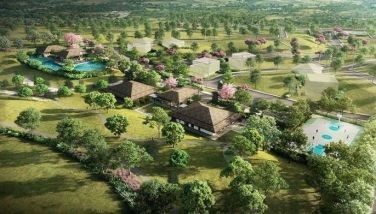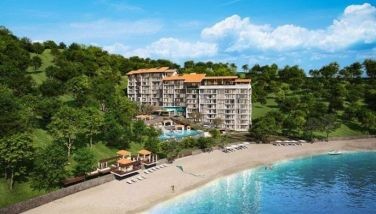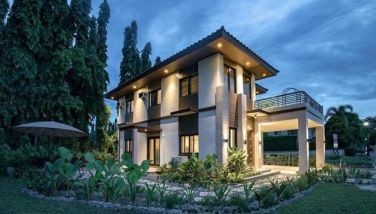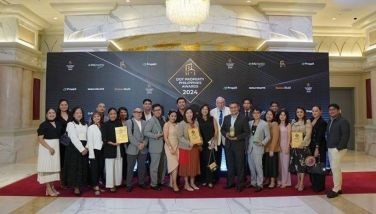Dipterocarp clones now growing nationwide
July 4, 2004 | 12:00am
Clones of dipterocarp tree species are now robustly growing in various parts of the country, giving the local wood industry the encouraging assurance of future supply of timber from this group of trees.
This optimistic outlook can be attributed to the generation of a dipterocarp clonal technology by a researcher of the Department of Environment and Natural Resources-Ecosystems Research and Development Bureau (DENR-ERDB).
Credit for the development of the technology, called "non-mist clonal multiplication technique", goes to researcher Mitzi Tijana-Pollisco, who chalked up the research breakthrough in the early 1990s.
A clone is a vegetative copy of an original or mother/parent plant. Cloning is a propagation method that allows for selection of the best trees and replicating them with their superior or desired characteristics intact.
Dipterocarps are tree species known for their superior wood quality and large timber. They are regarded as the most economically important group of timber species, popularly tagged as "Philippine mahogany," a trade name in the international market.
Pollisco, who has received two science awards for the technology, recalled in an interview with this writer that the first dipterocarp clones were planted at the Mt. Palay-palay National Park in Ternate, Cavite, in 1997.
Since then, countless dipterocarp clones have been planted in DENR experimental forest areas and in private tree farms across the country. Even local governmment units (LGUs) have been adopting the technology for their reforestation activities.
The forestry sector has acknowledged the breakthrough’s significance, considering that dipterocarps are hard to regenerate naturally. They start flowering at 17-18 years old and repeat at a two to three-year interval. Their seeds remain viable only for two to three days after collection.
Pollisco pioneered in clonal propagation research on Philippine dipterocarps in the early 1990s under the "UNDP/FAO Project on Improved Productivity of Man-Made Forest Through Application of Technologies Advances in Tree Breeding and Propagation".
Using the clonal technology, rooted cuttings of prime dipterocarps were planted in various areas of the country.
Planted were red lauan, white lauan, apitong, bagtikan, tangile, guijo, gisok-gisok, yakal-saplungan, panau, dalingdingan, narig, and almon. These were planted in, among other areas, Nabunturan, Davao del Norte; Bislig, Surigao del Sur; Songco, Lantapan, and Malaybalay, all in Bukidnon; Sipocot, Camarines Sur; Japanese/Children’s Garden, Caliraya, Laguna; Ternate, Cavite; La Salle Postulancy, Lipa City, Batangas; Los Baños Experiment Station, Laguna; and Bayombong, Nueva Vizcaya.
"The dipterocarp clones showed notable growth performance compared with their seedling counterparts," Pollisco reported.
At the technology’s early stage, then President Fidel V. Ramos and then DENR Secretary Victor Ramos were impressed by it that they took steps to have it fully developed and disseminated. – RAF
This optimistic outlook can be attributed to the generation of a dipterocarp clonal technology by a researcher of the Department of Environment and Natural Resources-Ecosystems Research and Development Bureau (DENR-ERDB).
Credit for the development of the technology, called "non-mist clonal multiplication technique", goes to researcher Mitzi Tijana-Pollisco, who chalked up the research breakthrough in the early 1990s.
A clone is a vegetative copy of an original or mother/parent plant. Cloning is a propagation method that allows for selection of the best trees and replicating them with their superior or desired characteristics intact.
Dipterocarps are tree species known for their superior wood quality and large timber. They are regarded as the most economically important group of timber species, popularly tagged as "Philippine mahogany," a trade name in the international market.
Pollisco, who has received two science awards for the technology, recalled in an interview with this writer that the first dipterocarp clones were planted at the Mt. Palay-palay National Park in Ternate, Cavite, in 1997.
Since then, countless dipterocarp clones have been planted in DENR experimental forest areas and in private tree farms across the country. Even local governmment units (LGUs) have been adopting the technology for their reforestation activities.
The forestry sector has acknowledged the breakthrough’s significance, considering that dipterocarps are hard to regenerate naturally. They start flowering at 17-18 years old and repeat at a two to three-year interval. Their seeds remain viable only for two to three days after collection.
Pollisco pioneered in clonal propagation research on Philippine dipterocarps in the early 1990s under the "UNDP/FAO Project on Improved Productivity of Man-Made Forest Through Application of Technologies Advances in Tree Breeding and Propagation".
Using the clonal technology, rooted cuttings of prime dipterocarps were planted in various areas of the country.
Planted were red lauan, white lauan, apitong, bagtikan, tangile, guijo, gisok-gisok, yakal-saplungan, panau, dalingdingan, narig, and almon. These were planted in, among other areas, Nabunturan, Davao del Norte; Bislig, Surigao del Sur; Songco, Lantapan, and Malaybalay, all in Bukidnon; Sipocot, Camarines Sur; Japanese/Children’s Garden, Caliraya, Laguna; Ternate, Cavite; La Salle Postulancy, Lipa City, Batangas; Los Baños Experiment Station, Laguna; and Bayombong, Nueva Vizcaya.
"The dipterocarp clones showed notable growth performance compared with their seedling counterparts," Pollisco reported.
At the technology’s early stage, then President Fidel V. Ramos and then DENR Secretary Victor Ramos were impressed by it that they took steps to have it fully developed and disseminated. – RAF
BrandSpace Articles
<
>
- Latest
Latest
Latest
October 23, 2024 - 9:30am
By May Dedicatoria | October 23, 2024 - 9:30am
October 11, 2024 - 3:45pm
October 11, 2024 - 3:45pm
October 10, 2024 - 11:30am
October 10, 2024 - 11:30am
October 5, 2024 - 12:08pm
October 5, 2024 - 12:08pm
September 24, 2024 - 1:00pm
September 24, 2024 - 1:00pm
September 13, 2024 - 4:00pm
September 13, 2024 - 4:00pm
Recommended

























